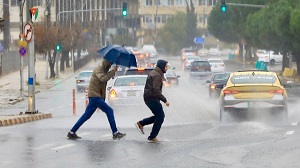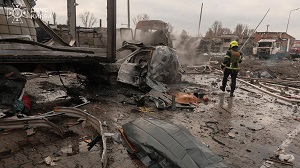Ramtha operation illustrates shift from response to anticipation — experts
The Jordan Times
AMMAN — The security operation in the northern border town of Ramtha ended with two wanted extremists killed and weapons seized.
The Public Security Directorate (PSD) said that a special unit raided on Tuesday evening a location in the Ramtha District, where two extremists were hiding.
PSD said in a statement that the two brothers were wanted on major investigative charges and on adopting extremist ideology.
Police said that the suspects opened heavy fire as soon as security personnel reached the site, wounding three members of the raiding force.
Security forces returned fire in accordance with rules of engagement, killing both suspects, it said.
The PSD said the brothers had barricaded themselves inside the site and used their mother as a human shield but security personnel were able to secure her safely without injury.
In remarks to The Jordan Times on Wednesday, experts said that the “flawless” and the quick execution of the operation with zero collateral damage indicates the “preparedness and high professionalism of security forces.”
They argued that the rapid outcome appeared built on prior surveillance, not spontaneous response, hailing the gradual release of information surrounding the incident by authorities.
For them, keeping the public informed and gradually updated about the operation reflected a “controlled communication approach consistent with sensitive security operations.”
While the operation was ongoing, Minister of Government Communications Mohammad Momani issued a statement on the operation which he shared on social media networks.
For experts, Jordan’s approach to internal threats has evolved, with the events in Karak in 2016 and in Salt in 2018 reshaping the country’s security rhythm and introducing a new mindset.
“The state shifted from responding to escalation to anticipating it,” they said.
Instead of allowing small cells to build networks or capabilities, experts explained that the doctrine now favours early disruption, mapping, monitoring and neutralising before a threat becomes action.
Security analyst Nidal Abu Zeid viewed the raid as evidence of penetration rather than reaction, saying, “This operation reflects a high level of security professionalism, the state chose the time, chose the location, and penetrated the cell before action could be taken, and it is clear they had been under monitoring for a long period.”
“It sits within a decade of accumulated learning, where anticipation replaces aftermath and time becomes a tool, not a pressure.”
“Neutralisation was delayed deliberately to protect the suspects’ mother, who was used as a shield, meaning the operation was not simply forceful but controlled and disciplined,” Abu Zeid said.
Explaining that terrorism and radicalism still posing a serious threat to Jordan, Abu Zeid said, “This was not random criminal behaviour but ideological continuation and a reminder that risk does not always appear in isolation but in inheritance.”
While Abu Zeid explained how the raid unfolded, strategic analyst Thamer Anasweh detailed why it matters.
“This operation is not the first and will not be the last, what remains constant is the state’s ability and professionalism in confronting plots targeting Jordan’s stability and national security,” Anasweh said.
Anasweh echoed Abu Zeid’s remarks that terror is still a serious threat to Jordan, adding, “There are agenda that seek to reproduce regional instability within Jordan, to bring the country into the same orbit of volatility that surrounds it.”
“Jordan’s coherent internal front, people and state, remains the strongest defence against such attempts, and national security is a red line under the King,” he said.
For Anasweh and Abu Zeid, the operation in Ramtha did not end quickly with zero collateral damage because it was small, but rather because it was anticipated and the suspects were mapped, tracked and neutralised before gaining reach or influence.
For them, the operation “illustrated a mindset where the state moves first, not second, where threat is intercepted before building ground, and where timing becomes a form of security in itself.”
Latest News
-
 ‘Israel’ vows “no calm” in Lebanon
‘Israel’ vows “no calm” in Lebanon
-
 Safadi, German counterpart discuss bilateral relations, regional developments
Safadi, German counterpart discuss bilateral relations, regional developments
-
 Unstable weather brings rain, fog across Jordan on Tuesday
Unstable weather brings rain, fog across Jordan on Tuesday
-
 Ukraine, Russia trade deadly strikes as negotiators hammer at deal
Ukraine, Russia trade deadly strikes as negotiators hammer at deal
- UN seeks 'impartial' probe into Israeli strikes in Lebanon